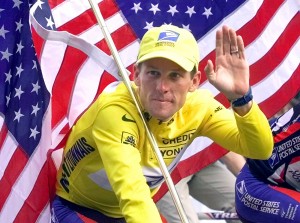
This July 23, 2000 file photo shows Tour de France winner Lance Armstrong riding down the Champs Elysees with an American flag after the 21st and final stage of the cycling race in Paris. The superstar cyclist, whose stirring victories after his comeback from cancer helped him transcend sports, chose not to pursue arbitration in the drug case brought against him by the U.S. Anti-Doping Agency. That was his last option in his bitter fight with USADA and his decision set the stage for the titles to be stripped and his name to be all but wiped from the record books of the sport he once ruled. (AP Photo/Laurent Rebours, File)
LOS ANGELES – Cyclist Lance Armstrong plotted his career strategy Saturday after the US anti-doping agency banned him from the sport for life and stripped him of the record seven Tour de France titles.
USADA branded Armstrong a dope cheat Friday, a day after the 40-year-old Texan said he would not pursue a bid to clear himself of charges that he used performance enhancing drugs to win cycling’s most prestigious race from 1999 to 2005.
The agency laid out five rule violations for which Armstrong has been sanctioned, saying the cancer survivor who became a hero to millions took part in a systematic doping conspiracy with his then US Postal Service team.
It said that, as Armstrong has dropped out of an arbitration process, he “has received a lifetime period of ineligibility and disqualification of all competitive results from August 1, 1998 through the present”.
Along with his celebrated haul of Tour titles, Armstrong stands to lose the Olympic bronze medal he won in 2000 along with other race titles, prize money and other awards.
The International Cycling Union, the sport’s governing body based in Aigle, Switzerland, had been fighting USADA for jurisdiction over Armstrong’s case and said Friday it wanted to see USADA’s full explanation for the sanctions before acting.
However, USADA’s statement made it clear they believe the UCI is bound by the World Anti-Doping Code to back up its findings.
“Because Mr. Armstrong could have had a hearing before neutral arbitrators to contest USADA’s evidence and sanction and he voluntarily chose not to do so, USADA’s sanction is final,” the agency’s statement said.
Armstrong had long denied accusations of doping but said Thursday he would no longer even address the issue.
“Today I turn the page,” he said. But hours after USADA’s announcement on Friday he made it clear that doesn’t mean he’ll disappear, tweeting his intention to compete in a local mountain bike race in the Aspen area in Colorado called the Power of Four.
“Excited to be racing the #poweroffour tomorrow here in @AspenCO,” Armstrong tweeted, apparently confident of a warm welcome from the local cycling community.
Certainly Armstrong had already received support from leaders of the anti-smoking and anti-cancer causes that he champions, and from sports apparel giant Nike.
“Lance has stated his innocence and has been unwavering on this position. Nike plans to continue to support Lance and the Lance Armstrong Foundation, a foundation that Lance created to serve cancer survivors,” the firm said.
Armstrong, who has branded the USADA probe a “witch hunt, had gone to court in a bid to block the agency’s proceedings.
But on Monday a federal judge in his hometown of Austin dismissed his lawsuit, leaving Armstrong until midnight on Thursday to tell USADA whether or not he would seek arbitration.
“I have been dealing with claims that I cheated and had an unfair advantage in winning my seven Tours since 1999,” Armstrong said Thursday.
“The toll this has taken on my family, and my work for our foundation and on me leads me to where I am today — finished with this nonsense.”
USADA maintains that Armstrong used banned substances — including the blood-booster EPO, steroids and blood transfusions — dating back to 1996, and said 10 of his former teammates were ready to testify against him.
If the UCI confirms the move, it faces a potential headache of choosing new winners for the seven disputed tours, as a number of cyclists who finished behind the American have also been implicated in doping scandals.
Indeed, Armstrong has argued that at least some of the witnesses who have implicated him cannot be trusted as they are themselves admitted dope cheats.
Former teammate Floyd Landis, who finally admitted doping years after he was stripped of his 2006 Tour de France title, accused Armstrong of systematic doping, helping trigger a federal government probe of Armstrong and others.
That investigation ended in February with no criminal charges brought, but it apparently provided further impetus to USADA’s probe of the cyclist.
USADA said it also had blood tests taken from 2009-2010, when Armstrong briefly came out of retirement to compete internationally again, that were “fully consistent” with blood doping.
Armstrong, who retired from cycling last year, said he passed hundreds of drug tests during his career and adhered to the rules in place at the time of his Tour de France wins.
“I refuse to participate in a process that is so one-sided and unfair,” he said, alleging that from the start the probe had been “about punishing me at all costs.”
However, World Anti-Doping Agency chief John Fahey said Armstrong’s decision not to fight the charges could only be seen as an admission of guilt.
“There can be no other interpretation,” he said.

